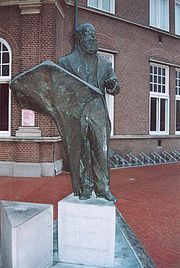
Anthony Winkler Prins
Encyclopedia

Voorst
Voorst is a municipality and a town in the eastern Netherlands.- Population centres :* Appen * Bussloo...
, 30 or 31 January 1817 – Voorburg
Voorburg
Voorburg is a Dutch town and former municipality in the western part of the province of South Holland, the Netherlands. As also Leidschendam and Stompwijk, it is part of the municipality Leidschendam-Voorburg. It has approximately 39,000 inhabitants....
, 4 January 1908) was a Dutch
Netherlands
The Netherlands is a constituent country of the Kingdom of the Netherlands, located mainly in North-West Europe and with several islands in the Caribbean. Mainland Netherlands borders the North Sea to the north and west, Belgium to the south, and Germany to the east, and shares maritime borders...
writer
Writer
A writer is a person who produces literature, such as novels, short stories, plays, screenplays, poetry, or other literary art. Skilled writers are able to use language to portray ideas and images....
. He is remembered mostly for being chief editor of the Winkler Prins encyclopedia.
Besides being an encyclopedist, Winkler Prins (a double surname) was a "Doopsgezind" (Mennonite
Mennonite
The Mennonites are a group of Christian Anabaptist denominations named after the Frisian Menno Simons , who, through his writings, articulated and thereby formalized the teachings of earlier Swiss founders...
) preacher
Preacher
Preacher is a term for someone who preaches sermons or gives homilies. A preacher is distinct from a theologian by focusing on the communication rather than the development of doctrine. Others see preaching and theology as being intertwined...
. He also wrote editorials for many newspaper
Newspaper
A newspaper is a scheduled publication containing news of current events, informative articles, diverse features and advertising. It usually is printed on relatively inexpensive, low-grade paper such as newsprint. By 2007, there were 6580 daily newspapers in the world selling 395 million copies a...
s, as well as poetry.
Winkler Prins studied science and literature in Utrecht
Utrecht (city)
Utrecht city and municipality is the capital and most populous city of the Dutch province of Utrecht. It is located in the eastern corner of the Randstad conurbation, and is the fourth largest city of the Netherlands with a population of 312,634 on 1 Jan 2011.Utrecht's ancient city centre features...
and later studied theology at the Doopsgezind Seminarium (Mennonite Seminary) in Amsterdam. From 1841 to 1850, he preached in the village of Tjalleberd
Tjalleberd
Tjalleberd is a small village in Heerenveen in the province Friesland of the Netherlands and has around the 737 citizens ....
.
From 1850 to 1882, Winkler Prins preached in the northern town of Veendam
Veendam
Veendam is a municipality and a town in the northeastern Dutch province of Groningen.A Holland America Line cruise ship, the MS Veendam, is named after the city.- Population centres :...
, where he completed his encyclopedia in 1882. He was very important to the community, not just as a preacher, but also because he founded a high school (which still exists; see external links), a seafaring school and a Masonic Lodge
Masonic Lodge
This article is about the Masonic term for a membership group. For buildings named Masonic Lodge, see Masonic Lodge A Masonic Lodge, often termed a Private Lodge or Constituent Lodge, is the basic organisation of Freemasonry...
.
After he retired as a preacher in 1882, he went to live with his daughter in Voorburg, where he died and was interred in 1908. A statue of Winkler Prins was erected outside the Veenkoloniaal Museum ("Peat Colony Museum") in Veendam in 1991; see photo. On September 9, 2005, the Museum had the remains of Winkler Prins and his wife Henderika reburied in the graveyard of the Reformed Church in Veendam.
Winkler Prins' son Jacob (born in Tjalleberd on 5 February 1849, died at sea on 25 November 1907) was a poet (mostly of sonnet
Sonnet
A sonnet is one of several forms of poetry that originate in Europe, mainly Provence and Italy. A sonnet commonly has 14 lines. The term "sonnet" derives from the Occitan word sonet and the Italian word sonetto, both meaning "little song" or "little sound"...
s) and a painter.
External links
- Winkler Prins Encyclopedia (in DutchDutch languageDutch is a West Germanic language and the native language of the majority of the population of the Netherlands, Belgium, and Suriname, the three member states of the Dutch Language Union. Most speakers live in the European Union, where it is a first language for about 23 million and a second...
) - High school founded by Winkler Prins (in Dutch)
- "Peat Colony Museum"

